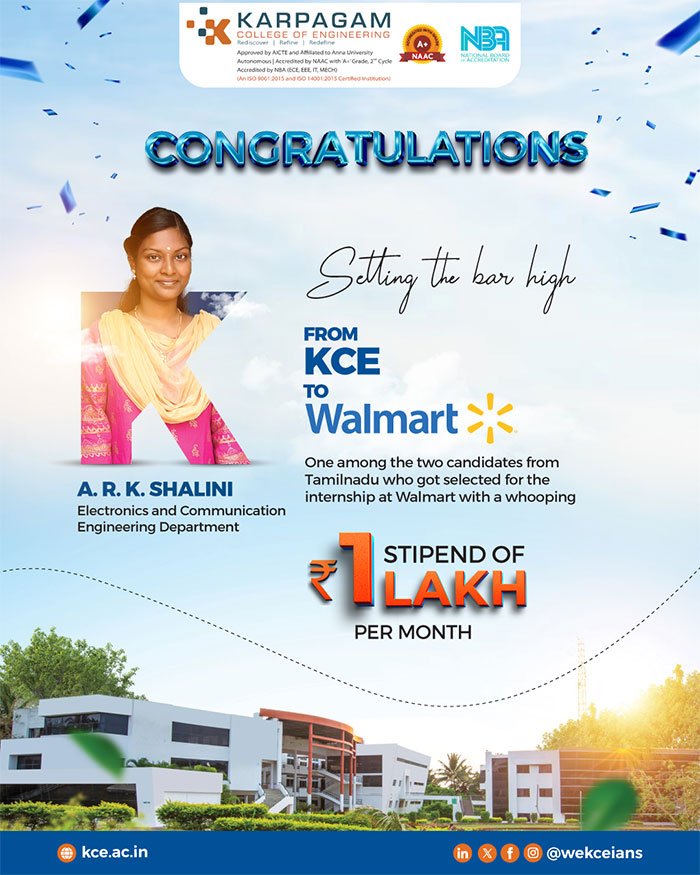About the Department

Courses Offered
- B.E. Computer Science and Design
Vision
To produce computer design professionals by providing high quality education in the field of computer science and design technology to achieve strong employability research and thereby orient towards serving globalized and regional technology societies.
Mission
- Provide high quality education in computer science and design domain to prepare our graduates leading to high employability and contributing to the economic, scientific and social development of the nation
- Promote excellence in teaching scholarly activity creative endeavours and public service by following effective teaching and research methodologies
- Establish centres of research in the areas of computer science and design by imparting state-of-the-art technical knowledge to meet the immediate needs of the society
Regulations
Programme Educational OBJECTIVES (PEOs):
- PEO1: Graduates will be prepared to the practice and grow as computing and design professionals, conducting research undertaking professional leadership entrepreneur graphics and game designing developing maintaining projects in various technical areas of computer science and design
- PEO2: Graduates will be nurtured to use and apply computer science and design principles through lifelong learning creatively and responsibly with a high degree of professionalism and with a clear understanding of ethical and legal issues and produce tangible contributions in their profession
- PEO3: Graduates will be trained to communicate and work effectively on the multidisciplinary engineering projects related to computer science and design with strong professional and work ethics for the betterment of the society
Programme Specific Outcomes (PSOs):
- PSO1: Demonstrate the ability to understand analysis design implement test and evaluate the principles and working of the hardware and software 3d modeling animates multimedia game and graphics aspects of computer science with strong professionals engineering practices and strategies
- PSO2: Provide effective and efficient solutions to complex problems using acquired knowledge in various domains and thereby to undertake research challenge in the fields of science and digital design
PO1: Engineering knowledge
Apply the knowledge of mathematics, science, engineering fundamentals, and an engineering specialization to the solution of complex engineering problems.
PO2: Problem analysis
Identify, formulate, review research literature, and analyze complex engineering problems reaching substantiated conclusions using first principles of mathematics, natural sciences, and engineering sciences.
PO3: Design/development of solutions
Design solutions for complex engineering problems and design system components or processes that meet the specified needs with appropriate consideration for the public health and safety, and the cultural, societal, and environmental considerations.
PO4: Conduct investigations of complex problems
Use research-based knowledge and research methods including design of experiments, analysis and interpretation of data, and synthesis of the information to provide valid conclusions.
PO5: Modern tool usage
Create, select, and apply appropriate techniques, resources, and modern engineering and IT tools including prediction and modeling to complex engineering activities with an understanding of the limitations.
PO6: The engineer and society
Apply reasoning informed by the contextual knowledge to assess societal, health, safety, legal and cultural issues and the consequent responsibilities relevant to the professional engineering practice.
PO7: Environment and sustainability
Understand the impact of the professional engineering solutions in societal and environmental contexts, and demonstrate the knowledge of, and need for sustainable development.
PO8: Ethics
Apply ethical principles and commit to professional ethics and responsibilities and norms of the engineering practice.
PO9: Individual and team work
Function effectively as an individual, and as a member or leader in diverse teams, and in multidisciplinary settings.
PO10: Communication
Communicate effectively on complex engineering activities with the engineering community and with society at large, such as, being able to comprehend and write effective reports and design documentation, make effective presentations, and give and receive clear instructions.
PO11: Project management and finance
Demonstrate knowledge and understanding of the engineering and management principles and apply these to one’s own work, as a member and leader in a team, to manage projects and in multidisciplinary environments.
PO12: Life-long learning
Recognize the need for, and have the preparation and ability to engage in independent and life-long learning in the broadest context of technological change.
| S.No | Name | Designation | Qualification |
|---|---|---|---|
| 1 | Dr. Madhumitha R | Professor and Head | M.E, Ph.D |
| 2 | Ms. Vennila M | Assistant Professor | M.E |
| 3 | Ms. Sandhiya V | Assistant Professor | M.E |
| 4 | Mr. Arul A | Assistant Professor | M.E |
| 5 | Ms. Dhivya P | Assistant Professor | M.E |
| 6 | Mr. Vivek Amruth C | Assistant Professor | M.Tech. |

